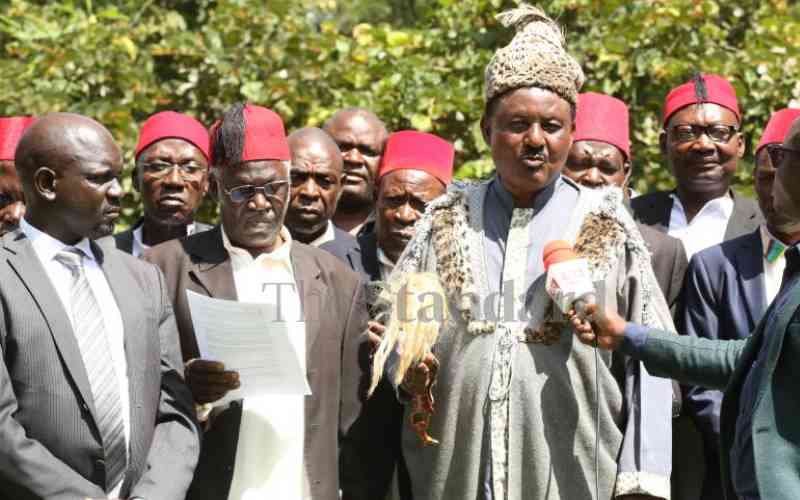The Centre for Mathematics and Science Technology Education in Africa (CEMASTEA) is out to improve science and mathematics teaching in secondary schools across the country. The public institution under the ministry of education with the mandate to uplift the teaching of science and mathematics across the continent is using school holidays to achieve its goal in Kenya.
To that end, over 300 science and mathematics teachers in Siaya and Kisii Counties underwent intensive induction training last week to whet their skills at Rang’ala Girls High School and Kisii High School respectively. They were issued with certificates.
The week long training sessions exposed teachers from the two counties to modern teaching methods, techniques and equipment to enable them develop problem solving skills, boost creativity and become innovative, attributes they are expected to pass to their students.
Addressing teachers drawn from five Kisii Sub Counties at Kisii School, the Science, Technology, Engineering and Mathematics (STEM) coordinator at CEMASTEA Dr Tom Mboya Okaya said more than 20,000 mathematics and science teachers with 14-20 years teaching experience in 21 Counties were currently undergoing training at various centres.
He said Teachers with similar experience in the remaining 26 Counties will be trained during the August school break. “CEMASTEA is determined, in collaboration with other stakeholders, to enhance the capacity of young Kenyans in science, technology, engineering and mathematics,” observed Dr Okaya.
“Educating for sustainability equips students with knowledge, skills, and attitudes that help them build sustainable communities,” he added..
Dr Okaya disclosed that model schools launched in 2016, one in each of the 47 Counties had doubled to 94 after 47 new ones were selected this year “to encourage students in secondary schools to consider pursuing STEM related careers through specialized designed activities”.
Dr Okaya said the introduction of STEM laboratories in the model schools will make it possible for projects to be developed and improved continuously by students with a possibility of enhancing their viable enterprise.
Unlike traditional science laboratories used for teaching and learning, STEM laboratories are venues for students to try out their ideas for as long as possible,” he clarified..
“Other than focusing on passing examinations students are expected to use what they learn in class to try-out and design possible solution (engineering) to problems or challenges within their locality while teachers are expected to use inquiry based teaching that enhances collaborative, cooperative and critical thinking skills among learners,” said Dr. Okaya.
He hinted at the possibility of introducing escape rooms, a concept used in developed countries not only for team building but for purposes of promoting students’ interest in science and mathematics.
”Teams of 4 to 6 students are locked up in a room for 60 minutes to solve scientific and mathematics puzzles using technology and engineering skills to escape the room.
“The aim is to popularize and empower Kenyan teachers in education for sustainable development by establishing broad teaching and learning processes that emphasize an interdisciplinary and holistic approach, which promotes critical and creative thinking in education,” said Dr Okaya..
He said educating for sustainability equips students with knowledge, skills, and attitudes that help them build sustainable communities that emphasize an interdisciplinary and holistic approach, which promotes critical and creative thinking in education.
“The Baseline study carried out by CEMASTEA last year revealed that though the STEM model schools had income generating projects such as poultry, horticultural, dairy farming among others they rarely involved students. Education for sustainable development approach encourages involvement,” said Dr Okaya.
Stay informed. Subscribe to our newsletter
The Kisii Teachers Service Commission (TSC) County Director Mr Gumbe Adede cautioned teachers against acts that portray them as not committed to their students. “Be warned that teachers are never on holiday unless with written permission from the County TSC office,” Mr Adede admonished.
 The Standard Group Plc is a
multi-media organization with investments in media platforms spanning newspaper
print operations, television, radio broadcasting, digital and online services. The
Standard Group is recognized as a leading multi-media house in Kenya with a key
influence in matters of national and international interest.
The Standard Group Plc is a
multi-media organization with investments in media platforms spanning newspaper
print operations, television, radio broadcasting, digital and online services. The
Standard Group is recognized as a leading multi-media house in Kenya with a key
influence in matters of national and international interest.
 The Standard Group Plc is a
multi-media organization with investments in media platforms spanning newspaper
print operations, television, radio broadcasting, digital and online services. The
Standard Group is recognized as a leading multi-media house in Kenya with a key
influence in matters of national and international interest.
The Standard Group Plc is a
multi-media organization with investments in media platforms spanning newspaper
print operations, television, radio broadcasting, digital and online services. The
Standard Group is recognized as a leading multi-media house in Kenya with a key
influence in matters of national and international interest.





